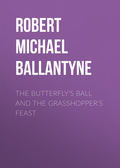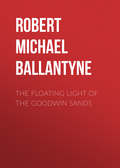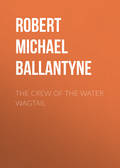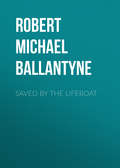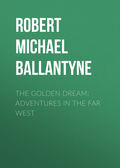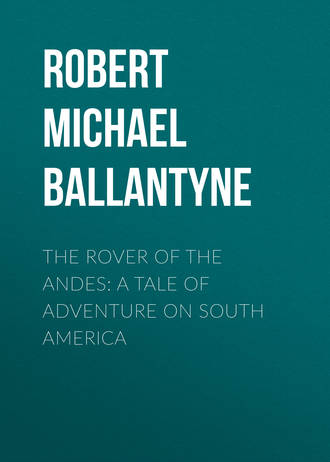
Robert Michael Ballantyne
The Rover of the Andes: A Tale of Adventure on South America
Chapter Ten.
Recounts some Terrible and some Vigorous Deeds
How long our hero lay in this state he could not tell, but on recovering his faculties he became conscious of the fact that he was in total darkness, lying on his back, with a tremendous weight pressing on his chest. For a few moments he remained still, quite unable to recollect what had occurred, or where he was.
Suddenly memory resumed its office—the earthquake! the fall of the hotel!—and, with a gush of horror, he realised the terrible truth that he was buried alive.
The reader must have been in the position we describe to understand fully the feelings of the poor youth at that moment. His first impulse was to make a violent effort to shake off the intolerable weight that almost suffocated him; but his efforts, strong though he was, proved in vain. It felt as if a mountain held him down. Then the thought of Manuela rushed in upon him, and he uttered a loud cry. The sound of his voice in the confined space was terrible. It seemed to rush in upon his brain with awful din. In his agony, a feeling of frantic despair came over him, and, with the strength of a giant, he struggled to be free, but still without success. Exhausted as much by his horror as by his efforts, he lay for some minutes quite still, his brain keenly alive and thirsting, as it were, for some sound that might convey hope. No sound was to be heard, save the intense beating of his own pulsations which seemed to throb into his ears, and down into his very extremities.
As he lay listening, it came strangely into his thoughts, with something like a feeling of regret, that it would be very hard for him to die! So much strong life as he possessed must, he thought, take long to destroy! But again, the memory of poor Manuela, perhaps in a similar condition, and certainly not far from him, banished the thoughts of self, and he listened once more intently.
All was still as the grave. The effort at self-control, however, calmed him a little, and, in a gentler mood, he tried to move his arms. The left arm was fixed as in a vice, and gave him so much pain, that he feared it had been broken. The right arm was also fast, but he felt that he could move his hand.
It was a feeble straw for the buried man to clutch at, yet it was strong enough to buoy up Hope in a stout heart. His courage returned, and with calm, resolute patience he set to work, uttering the fervent prayer, “Help me, O God!”
Where there was space for a hand to move freely, he knew there must be space to remove rubbish, though it might be ever so little. In a few minutes some handful of earth were thrust aside. Then, by drawing his arm upwards and pushing it downwards, he loosened the rubbish around it, and by slow degrees set it partially free. If he had been entombed in solid earth, this, he was well aware, could not have been possible; but, rightly judging that in a mass of mingled bricks, mortar, and beams there must be spaces more or less open, he worked away, with patience and in hope. The result was that he was able at last to touch with his right hand the object which lay so crushingly on his chest. It was an enormous beam. The utter impossibility of even moving it filled him for a moment with despair, but again he cried to God for help. The cry was answered, truly and effectively, yet without a miracle, for the very act of trust in the Almighty calmed his mind and set it free to consider intelligently.
He could not hope to lift the beam. It was far too heavy. Being so heavy, he knew it would have killed him outright if it had not been checked in its descent, and partially supported somehow. Might he not, then, scrape away the rubbish on which he lay until he should, as it were, sink away from the beam? He tried at once, and managed to get his right hand slightly under him. He could reach his haunch. It was a terribly slow process, but by degrees the busy hand reached the waist, drawing the rubbish out by small portions at a time. It seemed to him as if hours were spent in these painful efforts. Still no appreciable difference was made in his position, and he had by that time pushed his hand as far up under his back towards his neck as it was possible to turn it. Finding that he could scrape away no more in that direction, he now sought to deepen the hollows already made. In doing so he got hold of a brick, which he wrenched out with a desperate effort. The result was instantaneous relief, for he seemed to subside, not much, indeed, but sufficiently to permit of his breathing freely.
With a fervent exclamation of thankfulness he turned slightly round, and drew his left arm out from the rubbish. He felt it anxiously. It was bruised a good deal, but not broken.
Although so greatly relieved that he felt for a few moments almost as if he had been delivered from death, the poor youth was still in a terrible case. The space in which he was confined did not admit of his sitting up, much less standing. What seemed to be a solid mass of the fallen wall was above him, prevented from crushing him by the beam before mentioned, while around him were masses of brick and mortar densely packed.
Again exerting his lungs, the youth shouted with all his might, and then paused to listen; but there was no reply. Then he shouted the name of Manuela, in the hope that she might hear, and answer, if still alive. But no answering voice replied.
Believing now that nothing could save him but a fixed purpose and a prolonged desperate effort on an intelligent plan, he prayed again for help, and then proceeded to enlarge his tomb by scraping the rubbish back under the beam, from beneath which he had drawn himself, and packing it tightly down. This enlarged the space, enabling him to get upon his knees. To work upward through the fallen wall would, he knew, be an impossibility. He therefore worked horizontally for some time, throwing the rubbish between his legs behind him, as, we presume, the moles are accustomed to do. Then he passed his hand along over his head, and found that the solid wall was no longer above him,—only disjointed bricks and beams.
With renewed hope and redoubled effort he now worked his way upwards, although well-nigh suffocated by dust, as well as by smoke arising from fires which had broken out in many places all over the ruined town. Suddenly, while thus engaged, he heard voices faintly. He shouted with all his might, and listened. Yes, he was not mistaken; he heard voices distinctly, and they appeared to be speaking in Spanish. With something like a bounding of the heart he repeated his shout, and renewed his labours.
If he had known the character of the persons who had thus encouraged him, his hopes would not have been so strong.
We have said that the entire town had been levelled by one tremendous convulsion, and that in many places fires had broken out among the ruins. These fires sent up dense volumes of smoke, which naturally attracted people from all quarters of the surrounding country. Among them came bands of desperate and lawless characters, who fastened on the ruins as vultures seize on carrion. They resembled the unclean birds in more respects than one, for they went about as long as there was anything of value to be seized, long after other people had been forced to quit the place owing to the horrible stench of the hundreds of corpses decaying, and in many cases burning, among the ruins.1
It was the voices of some of these lawless ruffians that Lawrence had heard. He soon became aware of their character by the terrible oaths which they used, and the fiendish laughter in which they indulged whenever he called for help. Knowing that he had nothing to hope from such miscreants, he ceased to call out, but toiled none the less vigorously to effect his deliverance. At last he managed to scrape through to the upper world; and a feeling of inexpressible relief filled his breast as a bright ray of sunshine shot into his prison.
That it was daylight did not surprise him, for the many hours which he had spent under ground seemed to him like weeks. But he soon found that he was not yet free. The hole which he had scraped was much too small to admit of the passage of even a little boy. In trying to enlarge it, he found, to his dismay, that on one side of it was an enormous beam, on the other a mass of solid masonry, which could not be moved without aid. Looking out, he saw nothing but confused heaps of smoking ruins, save in one direction, where, in the far distance, (for the hotel had stood on a mound), he could see a group of men engaged as if searching for something.
To these he shouted again, but did not attract their attention. Either they did not hear him, or did not care. Turning then to the beam, he tried with all his might to raise it, but failed, though it moved slightly. Encouraged by hope, and afterwards influenced by despair, he tried again and again, until his strength broke down.
At this juncture he heard footsteps, and saw a man passing near.
“Senhor! senhor!” he cried, in the best Spanish he could muster, “aid me to get out, for the love of God!”
A coarse insult was the only reply as the man passed on. A group of other men who passed soon after behaved as badly, for they only laughed at his entreaties.
It is difficult to say whether rage or indignation was more powerful in Lawrence’s heart, but both passions were equally unavailing in the circumstances. He felt this, and soon calmed down; so that when, half an hour later, another man passed that way, he addressed him in tones of respect and earnest entreaty.
The bandit, for such he was, seemed to be utterly unaffected; for although he must certainly have heard the appeal, he, like the others, passed on without taking the slightest notice.
“Senhor! senhor!” cried Lawrence, “I have a gold watch and chain, to which you—”
The man stopped, for the bait took at once. Turning, and walking towards the place from which the sound came, he soon found the hole through which our hero looked.
“Hand out the watch, senhor,” he said.
“No, no,” answered Lawrence; “aid me first to lift the beam.”
Whether the man understood the bad Spanish or not we cannot say, but instead of helping to lift the beam, he drew a pistol from his belt, and said—
“Hand out the watch, or I shoot!”
“Shoot away, then,” cried Lawrence, savagely, as he drew quickly back into his hole.
The report of the pistol followed the words, and the ball caused a cloud of dust and rubbish to mingle with the smoke.
A wild laugh of defiance from within told that our Englishman was not hurt.
“Ha—ha! Shoot again,” he cried, fiercely.
“No, senhor, no. You are brave. I will help you,” replied the miscreant.
Lawrence doubted the honesty of the man’s assurance, but of course thanked him, and expressed readiness to avail himself of his assistance. He kept carefully at the extreme end of the hole, however, while his murderous deliverer removed some of the rubbish from the beam, and so made it possible to raise it. Remaining quite still, Lawrence waited till he saw that the beam had been so far moved as to enlarge the space sufficiently for him to get through. Then, with a sudden spring à la Jack-in-the-box, he leaped out, and stood before the astonished bandit.
Lawrence, whose sense of honour taught him to hold his promise as sacred to a thief as to an honest man, had fully intended to give up his watch and chain to the man if he should remain peaceably disposed; but the bandit was not so disposed. Recovering from his surprise, he drew a second pistol from his belt and levelled it at Lawrence.
Thought is quick; quicker even than triggers. His length of limb happily flashed into the youth’s mind. Up went his foot with a sudden kick, and away went the pistol into the air, where it exploded after the manner of a sky-rocket! The bandit did not wait for more. He turned and fled, much to the satisfaction of the victor, who, overcome by prolonged exhaustive toil and excitement, sank down on a heap of rubbish, and lay there in a semi-conscious state. It seemed as if both mind and body had resolved to find rest at all hazards, for he lay perfectly motionless for nearly an hour,—not exactly asleep, but without being fully conscious of connected thought.
From this state of repose, if it may be so called, he was partially aroused by the voices of men near him, talking in coarse, violent language. Raising his head languidly, he observed a band of about eight or ten villainous-looking fellows busy round a hole, out of which they appeared to be drawing some sort of booty.
“A prize!” exclaimed one of the men; “be gentle; she’s worth taking alive.”
A loud laugh from the others roused Lawrence again, but a feeling of unwonted exhaustion oppressed him, so that he scarce knew what it was he heard.
Suddenly there arose a female voice, in a cry of pain. Lawrence started up on one elbow, and beheld Manuela struggling in the grasp of one of the band.
If electric fire had taken the place of blood in his veins, he could not have bounded up more quickly. The shock seemed to renew and double his wonted strength. Like the English bull-dog, with terrible purpose, but in absolute silence, he rushed over the rubbish towards the man who held the struggling girl. The man seemed to be a leader, being the only one of the band who carried a cavalry sabre. The others were armed, some with short swords, some with carbines and pistols.
Swift though Lawrence was, the chief saw him coming. He let go the girl, and made a wild cut at him with the sabre.
Lawrence received the cut on his left arm. At the same moment he struck the villain such a blow with his clenched fist, that it seemed to crush in his skull, and sent him headlong into the hole out of which they had just dragged the Indian girl. Fortunately he dropped his sabre as he fell. With a shout of defiance our hero caught it up, just in time to arrest the descent of a carbine butt on his head. Next moment the man who aimed the blow was cleft to the chin, and a united rush of the robbers was for the moment arrested.
Manuela, helpless and horror-struck, had stood motionless on the spot where the chief had released her. Lawrence caught her in his left arm, swung her into an angle of the broken wall, placed himself in front, and faced his foes.
The villains, though taken by surprise, were no cravens. Apparently they had already discharged their fire-arms, for only one fired at our hero with a pistol, and missed his aim. Flinging the weapon at his adversary with a yell of disappointment, he missed his aim a second time. At the same moment another of the band—one of the tallest and most ferocious-looking—sprang upon the youth with terrible fury. He knew well, apparently, how to use his weapon; and Lawrence felt that his experience at school now stood him in good stead. As the weapons of these giants flew around with rapid whirl and clash, the others stood aside to see the end. Doubtless they would have taken unfair advantage of their foe if they could, but Lawrence, turning his back to the wall, where Manuela crouched, prevented that. At last one dastardly wretch, seeing that his comrade was getting the worst of it, bethought him of his carbine, and began hurriedly to load. Our hero noted the act, and understood its fatal significance. With a bound like that of a tiger he sprang at the man, and cut him down with a back-handed blow, turning, even in the act, just in time to guard a sweeping cut dealt at his head. With a straight point he thrust his sword through teeth, gullet, and skull of his tall adversary, until it stood six inches out behind his head. Then, without a moment’s pause, he leaped upon the nearest of the other bandits.
Awe-stricken, they all gave back, and it seemed as if the youth would yet win the day single-handed against them all, when a shout was heard, and half a dozen men of the same stamp, if not the same band, came running to the rescue.
Lawrence drew hastily back to his protecting wall.
“Pray, Manuela, pray,” he gasped; “we are in God’s hands.”
At that moment two shots were heard away on their right, and two of the advancing bandits fell. An instant later, and Quashy bounded upon the scene with a high trumpet-shriek like a wild elephant. Pedro followed, brandishing the rifle which he had just discharged with such fatal effect. Lawrence joined them with a genuine British cheer, but their adversaries did not await the onset. They turned, fled, and speedily scattered themselves among the ruins.
“T’ank God, massa, we’s in time,” said Quashy, wiping with his sleeve the perspiration that streamed from his face, as they returned quickly to Manuela.
“We must not wait a moment here,” said Pedro, hurriedly. “There may be more of the villains about. But you are wounded, Senhor Armstrong.”
“Not badly,” said Lawrence. “It might have been worse, but the fellow was in such a hurry that the edge of his sabre turned, and I got only a blow with the side of it. If I had only had my good cudgel—by the way, it must be in the hole. It was in my hand when— Stay, I’ll return in a few seconds.”
He ran back to his late tomb, and quickly returned in triumph with his favourite weapon.
“Come, we must get away from this at once,” said Pedro, turning to Manuela. “No time for explanations. Are you hurt?”
“No; thank God. Let us go,” replied the girl, who was pale and haggard, as she staggered towards them.
“Take my arm,” said Lawrence, presenting his wounded limb.
The girl pointed with trembling hand to the blood.
“It is nothing—a mere scratch,” said Lawrence.
In his anxiety he forgot to speak in Spanish. Manuela appeared as if about to sink with fear. He caught her, lifted her in his arms as if she had been a little child, and, following Pedro’s lead, left the place which had been the scene of so many terrible events.
In the outskirts of the town there was a large low building of mud or sun-dried bricks, which had not been overthrown by the earthquake. To this Pedro conducted his companions. They found room in the place, though it was nearly full of survivors in all conditions of injury,—from those who had got mere scratches and bruises, to those who had been so crushed and mangled that life was gradually ebbing away. There seemed to be about fifty people in the room, and every minute more were being brought in.
Here Lawrence set down his burden, who had by that time quite recovered, and turned quickly to the guide.
“Come, Pedro,” he said, “I can be of use here; but we must have my own wound dressed first. You can do it, I doubt not.”
Pedro professed to be not only able but willing. Before he did it, however, he whispered in a low tone, yet with much emphasis, to Manuela—
“Don’t forget yourself! Remember!”
As he whispered pretty loud, and in Spanish, Lawrence overheard and understood him, and puzzled himself, not only that day, but for many days and nights after, as to how it was possible that Manuela could forget herself, and what it was she had to remember. But the more and the longer he puzzled over it, the less did he clear up his mind on the subject.
When it became known that Lawrence was a doctor, there was a visible increase of hope in the expression and bearing of the poor wounded people. And the youth soon justified their trustful feelings, for, with Pedro and Quashy as assistant-surgeons, and Manuela as head-nurse, he went about setting broken bones, bandaging limbs, sewing up wounds, and otherwise relieving the sufferers around him.
While this was going on the poor people were recounting many marvellous tales of terrible risks run, escapes made, and dangers evaded. During all this time, too, frequent shocks of earthquake were felt, of greater or less violence, and these afterwards continued daily for a month, so that the few buildings which had partially survived the first awful shock were finally levelled like the rest.
When Lawrence with his assistants had gone the rounds of the extemporised hospital, he was so completely worn out that he could scarcely keep his eyes open. Swallowing a cup of hot coffee hastily, he flung himself on a heap of straw beside one of his patients, and almost instantly fell into a profound lethargic slumber.
There was an unoccupied arm-chair in the room. Placing this beside the youth’s couch, the Indian girl sat down with a fan, purposing, in her gratitude, to protect her preserver from the mosquitoes, which were having an unusual bout of revelry over the sufferers that night.
Quashy, observing this as he lay down in a corner, shook his head sadly, and whispered to himself:
“Ah! you brown gal, you’s in lub wid massa. But it’s useless. De ole story ob unrekited affection; for you know, pretty though you is, massa kin nebber marry a squaw!”
Thus thinking, Quashy went sweetly to sleep.
So did most of the others in that crowded place. But Manuela stuck to her colours nobly. She kept awake until her pretty black eyes became lustreless, until her pretty brown face became expressionless, until the effort to continue awake became hopeless. Then her little head fell back on the cushion of the chair, the little mouth opened, and the large eyes closed. The little hand which held the fan dropped by her side. The fan itself dropped on the floor, and, like the others, poor Manuela at length found rest and solace in slumber.



